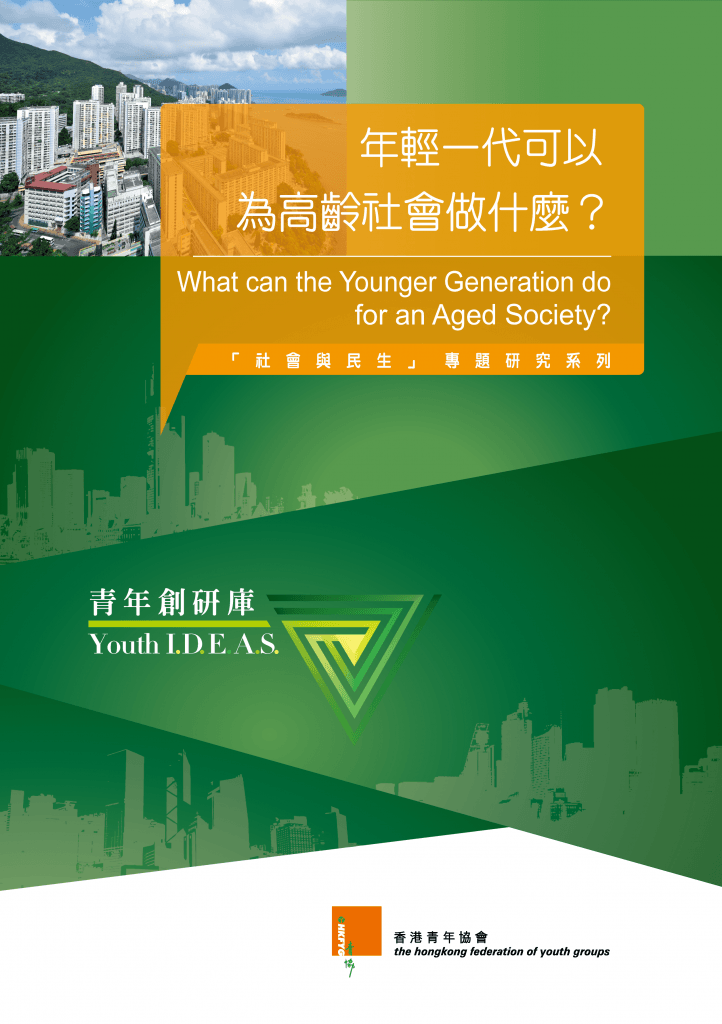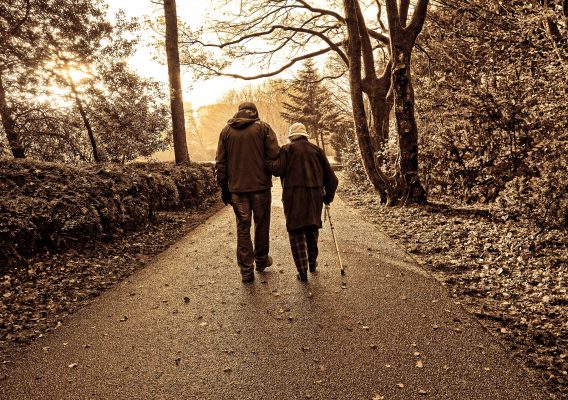What can the Younger Generation do for an Aged Society?
Youth I.D.E.A.S. 02
Society and Livelihood
What can the Younger Generation do for an Aged Society?
27 August, 2015

The ageing population is a global trend. According to the Census and Statistics Department’s recent estimate[1] of Hong Kong’s population, the proportion aged 65 or above is projected to rise markedly, from 13% in 2011 to 30% in 2041. This means a gradual change from one elder for every three persons in the population, to almost one for every seven.
The rise in the median population age may also reflect this trend. It is estimated that the median age in Hong Kong will rise from 41.7 in 2011 to 49.9 in 2041. This shows that the trend towards an ageing population is expected to continue.
Until the end of 2014, the population aged 65 or above in Hong Kong was about 1.09 million, or about 15% of the total. According to Florian Coulmas’ definition of the “Aged Society”, if the population aged 65 or above exceeds 14%, the society can be said to be an “Aged Society”. Hence, this description seems to fit Hong Kong.
On the other hand, the life expectancy of the Hong Kong population is expected to continue to increase. According to population projections, the life expectancy of men and women in 2041 will be 84.4 and 90.8 respectively, while the family structure will continue to shrink. The mean household size in 2041 is expected to drop to 2.7. The role of family in providing medical and other care services to the elderly will face challenges accordingly.
The issue of the ageing population is not solely about the elderly themselves. The trend has a long-term influence in terms of the personal, family and social perspectives. The younger generations, in particular, will face heavier social and economic burdens as a result. How will they face the challenges brought about by the ageing population? How will they bear the responsibilities of taking care of the elderly? And how can they prepare for becoming elderly themselves?
This study is based on poll interviews with young people across Hong Kong, as well as focus groups with both young and elderly people. It aims at an in-depth understanding of the above questions, ultimately leading to enhanced care for the elderly population and proposals for change based on the responses of today’s young people. As well as this, experts and scholars in this area were also interviewed to analyse the challenges and opportunities facing the ageing society.
Based on this analysis, this report provides suggestions about three aspects of the ageing society, namely increasing economic incentives to alleviate the pressure of taking care of the elderly; improving services and facilities to enhance community and residential care services for the elderly and promoting harmony between young and old to consolidate the virtue of respect for elders.
Discussion
- Hong Kong has entered the stage of being an “Aged Society”.
- Younger people are living within a generation gap.
- People should be doing some preparation for their own old age.
- In the meantime, young people are willing to support the “Aged Society”, but they are also worried.
- The government has an irreplaceable role in society.
Recommendation
- Enhancing economic incentives
1.1 The government should raise tax allowances for providing for parents and grandparents.
1.2 The government should allocate more resources to improve education and training opportunities for young people to enhance their competitiveness.
- Improving service facilities
2.1 Different policymaking authorities should take account of the elderly population when developing their policies.
2.2 Social facilities for the elderly, such as Elderly Canteens, should be constructed along with spaces to enhance harmony between young and old (such as the Greeneries Rest Area and Benches).
2.3 There should be service quotas for community care services to reduce waiting times.2.4 The supply of elderly hostels should be increased and their supervision strengthened.
2.5 Welfare should be provided to encourage and support social enterprises that will help provide daily necessities to the elderly.
- Promoting harmony between young and old
3.1 A Grandparent’s Day should be established.
3.2 Youngsters Love Homes should be promoted.
3.3 Young people should be encouraged to show support for elderly people living alone or with their spouse only.
3.4 Young people should also be encouraged to become friends with older people.




